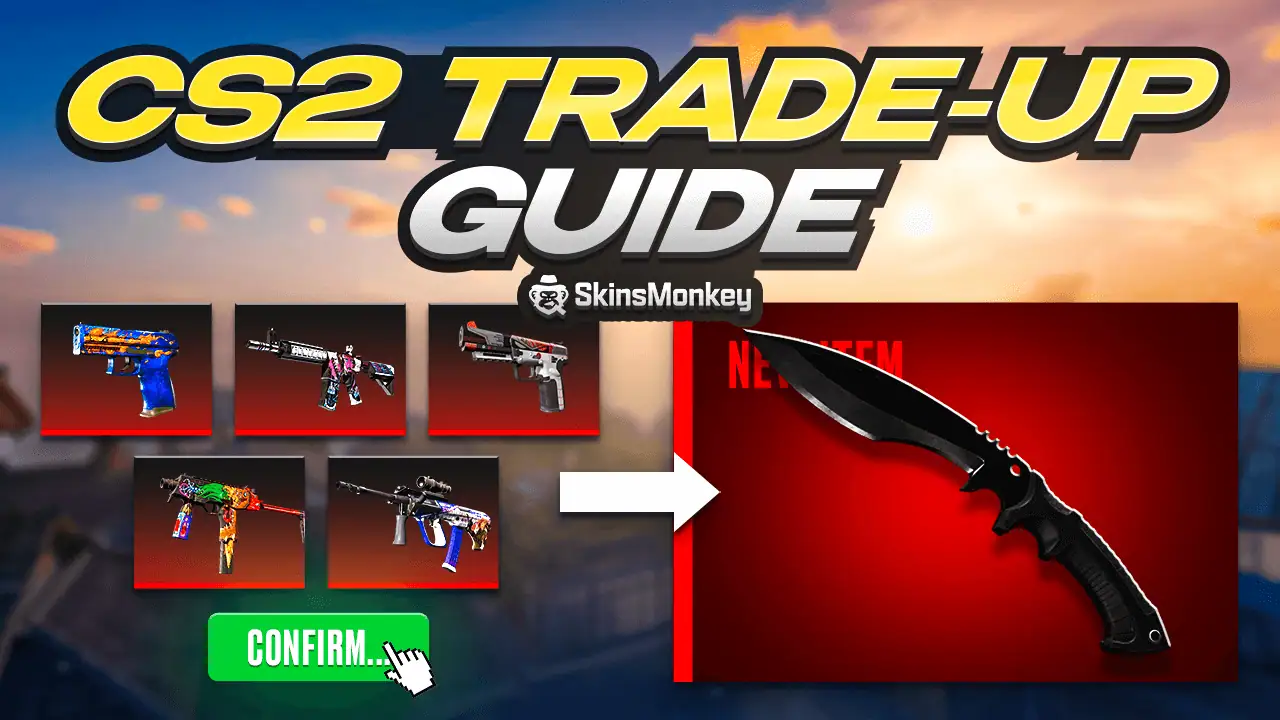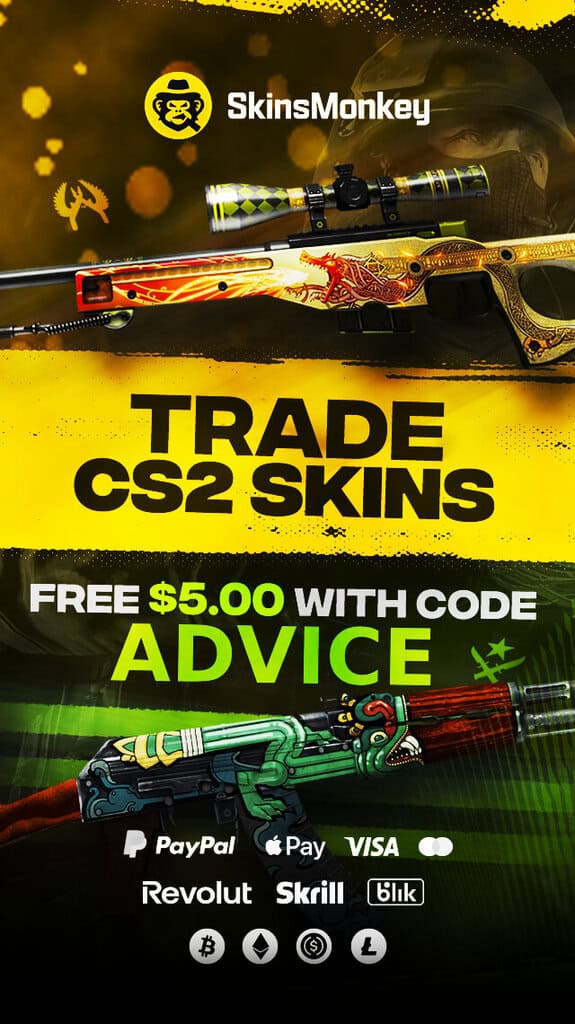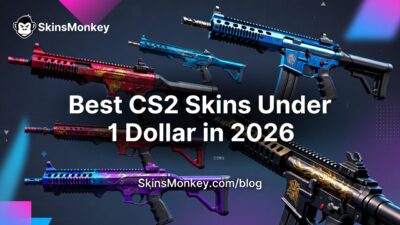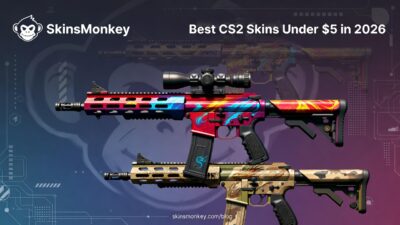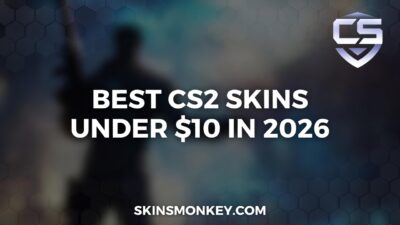Anyone who plays Counter Strike 2 regularly knows that weapon skins are one of the most important features of the game. The gameplay is of course important, but the skins economy is where many players hope to make a fortune. Steam users very often sell CS2 skins for a lot of money, which is why it’s such an important feature for so many players. Covert items, in particular, have become a form of currency in the CS2 skin economy, as their high value and demand make them a preferred medium of exchange among traders.
There are multiple ways to obtain new weapon skins for your Steam inventory. The most popular method is to simply open CS2 weapon cases, which contain random skins inside. Players can also trade with each other or purchase skins from third-party online markets. However, there is an easy way to obtain free CS2 skins, without spending a single dime. Here is all you need to know about the trade-up contract feature in CS2, a system that was updated to allow players to obtain knives and gloves by exchanging multiple covert-grade skins. Items created through this process may be subject to trade restrictions, impacting their liquidity and market value.
Sounds interesting? Here’s everything you need to know about CS2 trade-up contracts! The Steam Market is heavily influenced by the demand for high-tier items, and market manipulation can cause significant price fluctuations and volatility.
Remember, if you ever need some extra skins to use in your CS2 trade-ups, make sure to visit SkinsMonkey, where you can always trade CS2 skins for the best deals possible!
Key takeaways:
- Trade-up contracts allow players to exchange skins they don’t need into entirely new ones.
- Trade-up contracts require 10 skins of the same CS2 rarity, or 5 if you’re doing a knife trade-up.
- Skins crafted with trade-up contracts can be sold and traded on the Steam community market, as well as third-party marketplaces.
- Trade-up contracts can be used for investing in high-value items, and fluctuations in demand and glove prices are often driven by market manipulation and updates.
How Do Trade-Ups Work in CS2?
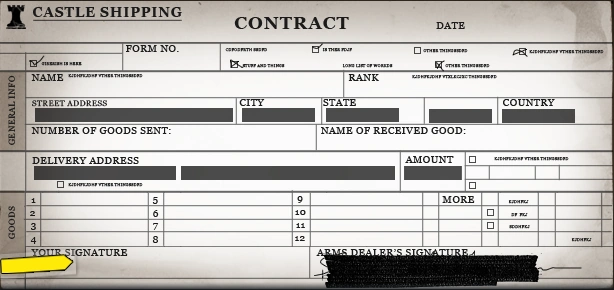
Trade-up contracts, although they might sound similar, are actually completely different from the standard CS2 skins trading. A trade-up contract, known as the arms deal contract in the past, is a quick and easy way to obtain free CS2 skins. Trade-ups are free because they don’t require you to pay any extra money. However, you will need to trade in 10 skins of the same CS2 skin quality you own, or five Covert skins for a knife or pair of gloves.
While in the past players could only craft skins up to the Covert CS2 rarity, with the latest CS2 knife crafting update players can now craft knives and gloves just like any other skin in the game, effectively allowing you to participate in knife trade ups. This new feature lets players use covert items as input for a chance to receive high-value knives or gloves.
This way, you can simply choose to sacrifice different skins you might not need to get a rare weapon skin. Understanding how contracts work is crucial; it involves understanding features, calculations, and strategies to manipulate odds and achieve desirable outcomes. The items provided in the contract directly determine the possible outcomes.
Trade-up contracts work by allowing players to exchange ten lower-tier skins for one higher-tier skin.
Here are some basic rules, which trade-up contracts follow:
- You can’t combine StatTrak and normal skins (if you trade-up StatTrak skins you will get a StatTrak skin a weapon grade higher)
- The collection of weapon skin you get depends on the skins you trade-in. Each skin you use in a trade-up contract increases the chances that the outcome skin will be from the same collection by 10% (meaning that, for example if you put in 10 skins from the Italy collection, you will have a 100% chance to get a skin from that collection)
- You must always use 10 skins of identical CS2 skin quality. After a successful trade-up you will receive a skin one weapon grade higher quality than the skins you traded.
When filling out a trade-up contract, the interface automatically displays details such as the date of the trade, your name, and rank, giving it an official look. Before final submission, players have a last opportunity to review their selections and cancel the contract if needed.
Before submitting the contract, you are prompted to sign with your mouse to confirm and finalize the trade.
Check out this video by Tech-savvy to learn more about CS2 trade-ups:
Although the process itself might be completely random, it’s still one of the best ways to utilize skins that you don’t need. Some players use a simulator to estimate possible outcomes before committing to a trade up. Many players have a collection of common cheap CS2 skins, which would be hard to sell on the Steam marketplace or anywhere else. However, with a trade-up contract, you can try your hand at giving up a number of skins you don’t need to receive an expensive CS2 skin.
Understanding Trade Up Contract Requirements
To successfully use a Trade Up Contract in CS2, players need to meet specific requirements. First and foremost, you must have weapon skins of the same quality, either all normal or all StatTrak skins. Mixing normal and StatTrak skins in a single contract is not allowed. The input skins can come from any collection, but they must be of the same grade tier, such as industrial grade or consumer grade. Any eligible item, such as a skin, knife, or glove, can be used as input as long as it meets the contract requirements.
When you submit your input skins, the contract will generate a new weapon skin of the next highest grade tier. This outcome skin is chosen randomly from one of the collections used in the trade. It’s important to note that the outcome skin will have a random CS2 float value, which can significantly affect its price and rarity.
Before attempting a Trade Up Contract, ensure you have the required number and type of skins. This preparation will help you avoid any issues and increase your chances of obtaining a valuable outcome skin.
Choosing the Right Skins for a Trade-Up Contract
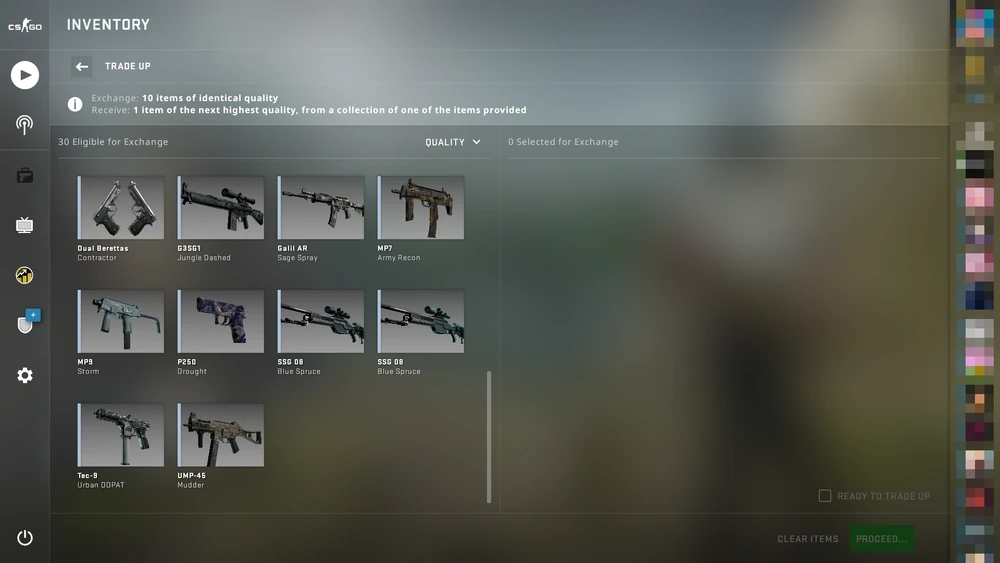
Selecting the right skins for a Trade Up Contract is crucial for maximizing your chances of a profitable outcome. One key factor to consider is the average float value of the input skins. Skins with lower float values, such as minimal wear, are generally more valuable than those with higher float values, like field-tested. The items provided in the contract directly influence the possible outcomes, so choosing the right combination is essential.
To increase the likelihood of getting a desirable outcome skin, aim to use skins from the same collection. This strategy boosts your chances of receiving a skin from that collection. Additionally, researching the prices of both the input skins and potential output skins is essential to ensure a profitable trade.
Using skins with a high mil spec grade can also enhance your chances of obtaining a rare or valuable outcome skin. The rarity of the input skins plays a role as well; using rare skins can increase the probability of getting a rare outcome skin.
By carefully selecting the right skins, considering their float values, and researching their prices, players can significantly improve their chances of making a profitable trade and obtaining an expensive CS2 skin. Some players even approach trade ups as a form of investing in the CS2 skin market, aiming to maximize long-term profit.
How Do Trade-Up Floats Work in CS2?
Although a trade-up contract is technically completely random, you can influence the outcome skin. In order to do this, you must first understand float values.
Every skin in the game can come in different float value. Float values are numerical statistics, which reflect the weapon skin condition. The better the float value of your skin, the newer will it look. Lower float values generally are covered in many scratches and are in the battle-scarred quality, while the highest float values correspond to factory new skins.
A float value is a scale between 0 and 1. While the float values correspond to the skin's quality, not all skins are available in all qualities, meaning that some skins will never have a float value on the battle-scarred level. Thanks to the float value mechanic, two skins with the same name can actually look different in-game.
So how do float values play into Counter Strike trade-up contracts? Depending on the average float value of the skins you trade in, you will receive a skin of a different quality. Thanks to this feature, a smart player can actually influence the outcome of their trade-up contract and receive a weapon skin of a better quality.
The outcome skin is calculated according to this mathematical formula:
- Output Float = Average Float Value of 10 skins* (Maximum Possible Float of Outcome – Minimum Possible Float of Outcome) + Minimum Possible Float
How To Quickly Calculate The Output Float values?
As you can see, the trade-up contracts aren’t really completely random. Of course, you can never really control what skin you get, however, you can influence what weapon quality you will receive. Understanding float values is the key to profiting on trade-up contracts, as you can limit the possible outcomes and receive a skin in a minimal wear or a tier higher quality, instead of consumer grade skins. Although calculating the outcome skin float value can be done by yourself, the formula itself involves a lot of numbers and calculating every trade-up this way would be very tedious.
This is why the best CS2 players always use a trade-up calculator for their trades. This way, you can quickly calculate the potential float value of the outcome skin, and even see what specific weapon skins you have a chance of receiving in the trade-up contract. Many players also use a simulator to predict possible trade-up outcomes, allowing them to simulate different scenarios before committing to a trade. Some calculators offer extended functionality, such as simulating trade-ups for knives or gloves, which helps users explore more diverse options and plan their trades more effectively. Trade-up calculators are all very easy to use. All you have to do is select the skins that you plan to trade up, and the calculator will tell you what skins you might receive in return. Some of the most popular trade-up calculators currently available are:
- Trade Up Spy
- CSGOfloat
- CSGO.exchenge
Is It Worth To Use Trade-up Contracts?
This question is difficult to answer since you never really know which exact skin you will receive. Still, a trade-up contract is a great way to turn cheap skins that you don’t need into potentially much more valuable skin. Even if a trade-up contract is a gamble, if you use a trade-up calculator, you can be sure you will come out on top. At this point, it's important to note that market fluctuations and player strategies are heavily influenced by trade up contracts, as changes in the value of high-tier skins can impact overall profitability.
If you enjoyed this article, make sure you check out our other guides and toplists, including:
FAQ
You need 10 skins of the same rarity, or 5 covert skins for a knife or pair of gloves.
No, you can't do souvenir trade-ups in CS2. Souvenir skins can only be bought, sold, and traded on the skin market.
Yes, with the latest update released this month players can now trade-up inot a knife or a pair of gloves.
A true gaming enthusiast, especially Counter-Strike: Global Offensive (CS2) and Rust. At SkinsMonkey, he is involved in creating game guides based on his own experience.
